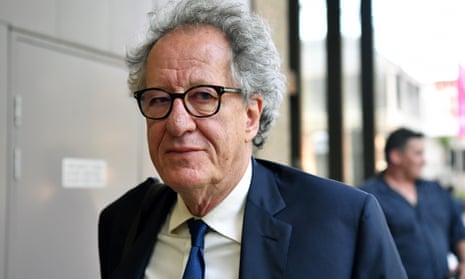A roll-call of prominent Australian thespians have lined up to testify on behalf of Geoffrey Rush in a dramatic day in the Oscar-winning actor’s defamation trial against Sydney newspaper the Daily Telegraph.
In scenes rarely witnessed in a federal court, an actor burst into song while defending Rush on the witness stand while a series of notable directors testified as to his character during Thursday’s hearing.
The star of the production was Australian actor Helen Buday, who Justice Michael Wigney remarked was creating “dramatic suspense” when she couldn’t immediately be found to take the stand, and then proceeded to engage in a fiery back-and-forth with the Telegraph’s barrister, Tom Blackburn SC.
Rush is suing the Telegraph over a series of articles published at the end of November and beginning of December in 2017 alleging he behaved inappropriately towards cast-member Eryn-Jean Norvill during a 2015 Sydney Theatre Company production of Shakespeare’s King Lear.
Norvill was not named in the Telegraph articles, but later agreed to appear as a witness for the newspaper.
The fourth day of the two-week trial was by far the most compelling of the production.
Among those appearing for Rush was Australia’s pre-eminent theatre director Neil Armfield, the actor John Gaden, film and television producer Robin Kershaw – best known for her work on the film Looking for Alibrandi – and the director Simon Phillips.
Buday, who lives in the south of France, appeared alongside Rush and Norvill in the production of Lear playing the king’s eldest daughter Goneril.
During her time on the stand Buday repeatedly clashed with Blackburn, sang twice while giving evidence, and was reluctant to leave the stand after her testimony was complete because she had more to say.
A longtime friend of Rush, she told the court she never witnessed any inappropriate behaviour from the actor during the production.
In a feisty and boisterous appearance Buday laughed loudly when Blackburn directed her attention to the use of an emoji in a text message Rush sent to Norvill in 2016.
On Tuesday Rush was asked by Blackburn about the June 2016 text in which he said he was “thinking of you (as I do more than is socially appropriate)”.
The message ended with an emoji of a face with a tongue hanging out, and Blackburn had asked whether it was “panting”.
“You’re trying to make something out of this that’s just not there,” Buday said. “I think it’s strange, odd, that you would read something sinister [into the message].”
Pushed by Blackburn whether she thought it was appropriate or “funny” for Rush to send the text to Norvill, she said she thought it was “delightful”.
“This I find a delightful text, that’s my answer I hope it’s really clear,” she said. “The whole text is charming, not funny. Funny can mean strange or humorous. It’s charming.”
The Telegraph is arguing a truth defence on the basis of evidence to be given by Norvill, who played the role of Cordelia in the production.
During his earlier cross-examination of Rush, Blackburn asserted that during rehearsals for the production Rush had made “groping” and “hour-glass” gestures towards Norvill, often sticking his tongue out and licking his lips in her direction.
Buday denied seeing any inappropriate behaviour from Rush during the production, though did say that Norvill had been “frustrated” with elements of the production and had been “drowning in the role”.
“I was playing a big sister and even though one of us poisons the other and one of us brings the French army in, as actresses we cared about each other and looked after each other,” she said.
Earlier on Thursday the court heard Neil Armfield, the director of the 2015 King Lear production, deny telling Rush he was being “creepy” during a scene with Norvill.
Armfield is considered Australia’s leading theatre director and a longtime friend and associate of Rush’s.
He gave evidence that he never told Rush a scene in the play involving Norvill was becoming “creepy and unclear” and that he did not witness the actor being inappropriate with her.
The trial has previously heard an allegation that during a scene in which Norvill’s character lay dead on the stage, Rush, playing Lear, had traced his fingers down Norvill’s body and over the side of her right breast.
Rush denied the claim during his own cross-examination.
Armfield said he had “no memory of that as an action”, and also denied telling Rush to be “more paternal”.
“You were concerned at a development in the way Mr Rush made contact with Ms Norvill in that final scene,” Blackburn said during his cross examination of Armfield.
“Something had developed [and] the motions he was using were becoming unclear in some way. Indeed creepy.”
“No, not at all,” Armfield responded.
“You gave Mr Rush a note to that effect didn’t you? [That the] motions were becoming creepy and unclear,” Blackburn said.
Armfield responded again: “I’ve already said I have no memory of such a note.”
Simon Phillips, the director of the Melbourne Theatre Company production of Twelfth Night that Rush pulled out of after the Telegraph articles, told the court Rush had been “in a state of anxiety and confusion”.
“Geoffrey’s anxiety about performing was that he felt [that] it would only take one person to heckle him as a result of the articles for his entire confidence as a performer to deflate,” he said.
Earlier, Armfield said he’d known Rush since 1979, describing him as “an internationally important actor” whose reputation had been “profoundly” impacted by the Telegraph articles.
“He kind of closed down as a kind of personality and there is I think unbelievable and gross damage which has been [done] by [the] publishing of these allegations in the Telegraph,” he said.
The trial continues.
